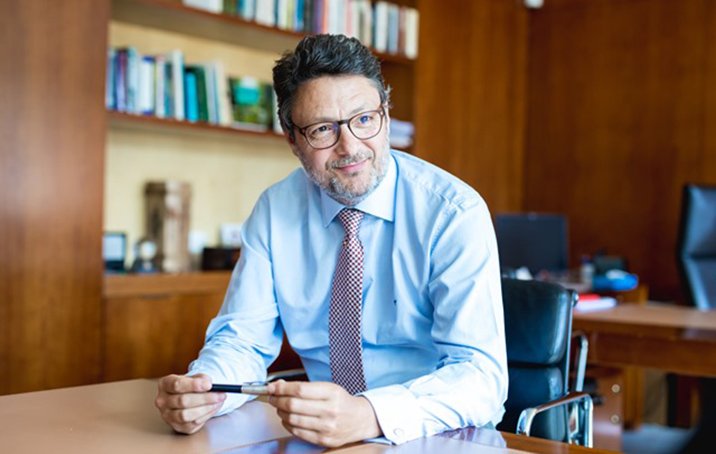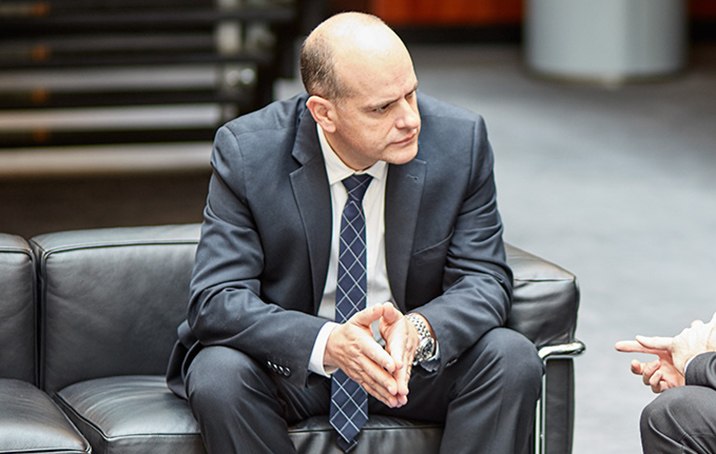International Banker interviews Pedro González Grau, CEO of MoraBanc
Andorra Expats | 12.28.2017 | MoraBanc editorial staff

The International Banker magazine has given MoraBanc the 2017 Best Commercial Bank of Andorra Award. In its last issue, there was an interview with the bank’s CEO, Pedro González Grau, that we have reproduced as it was published.
Simon Hughes of International Banker interviews Mr. Pedro González Grau, CEO of MoraBanc on the bank’s improving financial results, digital transformation, innovation in product strategy and the challenges in the Andorran banking sector.
Today I’m with Mr. Pedro González, the CEO of MoraBanc. It’s a pleasure to have you with us.
Thank you. It’s a pleasure to be here.
Now, I believe the bank is on track to deliver its first full year profit growth for the last seven years as of September 2017. What would be the main reason for this growth?
Three years ago, it was very clear that Andorra would sign up to full transparency within the international standards and international markets, automatic exchange of information, etc. That led us at the time to re-evaluate our strategy long-term. And it was very clear at the time that we needed to totally change our business model. We then realized that the quicker we could do that, the better the competitive advantage vis-a-vis our competitors domestically. And we had the solvency, and we had the initiative to be able to implement this plan as fast as possible to then get on track with growth once again. And we’ve done that. And as you said before, this year will be the first year of profit growth. Modest, but profit growth.
As I understand it, your three-year plan is in fact going to be completed at the end of this year, which is a whole year ahead of schedule. Is there any danger that it is being implemented too quickly?
That’s a good question. And to be honest, we never asked ourselves that question when we were implementing it. I’d say two things. The first one is, it’s a small bank. It’s 350 people. So the ability to reach out to every single one of the employees is easier than if it’s a large organization. So there was a lot of priming of every one at the bank for the need to do this change. And as much buy-in as possible at the initial. The other thing was that we were very close to all the different changes that we were implementing. So it was easy to spot bottlenecks and try to correct them as we went along. To be honest, it was never thought of being implemented in two years rather than in three. What we did know was that the faster we could implement it, the better the competitive advantage as a result of it, and the sooner we would get back on a growth track.
And you’re kind of focusing on the people side of it. What kind of internal checks are being implemented to ensure that each objective is completed to a satisfactory standard?
Well, as I said, two things. Number one, we have a very, very focused executive committee that is essentially looking at every single different measure of the plan. We did calendarize as much as possible everything that we wanted to do, and we were very much on top of those changes. It all comes with a transformation of the culture of the bank. And one of the things, probably the most important thing, was essentially making people responsible for their own changes. So personal attribution of results. And therefore that in essence also drove everyone to do as much as possible as fast as possible, and then bring it back to the table. Personal accountability essentially.
Okay. In these conversations, one of the key features often is the use of digital. And your flagship digital-transformation project is MoraBanc Digital. It appears to be very successful thus far. How is this changing the way the bank conducts business on a daily basis?
There’s two sides to the digital transformation that we’re experiencing. One is internal in terms of efficiency of processes, which is obvious. And the other one is, “How do we interact with clients?” Part of the transformation of the bank also led to a total re-segmentation of our client base. And more focused channels. In this case a digital channel specifically for certain segments of clients, and much tailoring of that digital offer to that specific channel. So we’re seeing over the first nine months of the year, uptakes of 50 percent in terms of new account openings. Forty percent in terms of money wires. The take-on has been surprising even for us.
The kind of link to that, you’ve recently started a new product-strategy department, partly to foster product innovation. And how does this work in practice?
Well, you link the product-development team to the different client segments, and essentially try to tailor products to every different client segment. It’s again part of the philosophy that we have as a bank. In other words, we have 35,000 clients; we don’t have millions of clients. Our approach is much more towards a client than towards a customer. We don’t see our clients as customers. We see them as clients. And, therefore, it’s a very wholesome relationship with each and every one of them. And different niches have different needs and different targets and different products. So we try and tailor for all those different segments.
And in that tailoring process, is there any collaboration with the fintech sector, which is generating ideas and solutions?
Sure. For us fintech is not so much a menace but a partner. If I may say so. We use agreements with fintechs extensively throughout the entire process. Whether its account opening and speed of account opening; whether it’s digital signature. Fintech for us is a tool to complement and to improve on the service we provide to clients. We don’t see it as a menace in the sense that we don’t feel that we can be disintermediated. Because as I said before, we’re not so much a customer bank, we’re a client bank, and therefore relationship is paramount. And, therefore, fintech provides us with a much more efficient way of getting through to the client.
Pulling back and looking at the kind of broader business, what proportion of your focus these days is on your private banking and commercial banking business in Andorra?
I would say that up until now, the main focus has been transforming Andorra and the underlying operations. That’s where the bulk of our business is. You have to understand MoraBanc is kind of a hybrid bank. On the one hand, it has a private-banking activity, and a wealth-management activity in our international subsidiaries. On the other hand, it has a commercial-banking business in Andorra. That commercial banking in Andorra has been the part that we really needed to refocus on. In other words, before we want to do anything anywhere, we need to be the strongest at home. And that took the most part of the whole transformation. At this point I would argue that probably now that we are back on growth, and Andorra is doing the heavy lifting on that, I have more time to spend on our international operations.
Okay, so where do things like wealth management or other businesses play a role in the moving forward?
Wealth management is our activities…our international activities are wealth management, based out of both Switzerland and Miami, where we have a registered investment advisor and a broker dealer. At this point, our strategy within Andorra is very clear, and obviously we’re fiercely competitive there. We’re now moving on to: how do we improve, and how do we grow our activities internationally? Andorra is a small market. Yes, it’s a market-share game. Internationally, we think we have a value proposition. Because of our 60 years of experience in servicing Spanish-speaking clients, because of the way with which we do private banking. And this particular focus on client relationship. We feel and we’ve seen that that is exportable to certain markets. We had growth north of 40 percent in our international activities in 2016. We want that to continue. And, therefore, we’re now much more focused on growing that.
Now, “We grant loans” is the motto of your advertising campaign, which is a way to position MoraBanc as the Andorran bank most likely to approve loans for individuals and companies. At a time when, like many other countries, Andorra is emerging from recession, does having such a positive approach towards loan provision pose the risk perhaps of higher nonperforming loans?
Yes, but it’s something that we’ve taken into account. The Andorran financial system represents about 20 percent of Andorran GDP. So therefore we see it as our obligation and for the good of the country to try and foster growth in Andorra as much as we possibly can. And obviously one of the ways is promoting loans. There is a risk of higher NPLs. But we’re starting from a base with a four percent ratio of NPL, a 62 percent loan-to-deposit ratio and a 19 percent Basel III solvency ratio. So there is some room for, you know, the NPL ratio to be tested. And we’re comfortable with that.
Now, earlier on you were talking about how critical it was to get everybody on side, so 350 or so people. How important is cultivating a teamwork environment in terms of achieving the bank’s ultimate goals?
I think that the thing that I’m most proud of over the last two years has been the change in culture at the bank. And that change in culture has been brought about because of the need to transform the bank. Typically banking structures are very hierarchical and very rigid. Our approach, because we were small, was based on personal attribution, personal responsibility and teamwork. We tried to flatten the hierarchical structure of the bank as much as possible. We tried to foster collaboration among different teams. And essentially, I think that has worked. I mean people would see the results of whatever they were doing very quickly, and it’s a self-fulfilling prophecy. You know, the more you do, the more people feel empowered, the more they do. And when they see the results, and hopefully this year they see growth again, then it all ties up together.
And linked to that, of course, is the issue of solvency. Can you briefly explain how important solvency has played in the bank’s overall prospects in recent times?
Solvency for us is key. I’d say for two reasons. The first reason is, remember Andorra has no central bank. And, therefore, you know solvency in itself is already important for a bank. But for a bank in Andorra, it’s even more paramount. And, therefore, that to us is sacred. Keeping the highest solvency rate in Andorra for us is principle number one. The other thing is, I happen to think solvency for any bank is important and will continue to be important, and clients will end up appreciating that. We’ve gone into a world where solvency has been demoted because, you know, if everything goes very badly, some supranational, international organization will step in and fix the solvency. That’s a dangerous proposition. That’s a very dangerous proposition. You’re talking about a business that tends to be ten times levered. You don’t play around with solvency. For us, solvency is key.
Another key issue we often touch on with our guests is the kind of environmental impact that the business is having. What specific ways are you doing to kind of reduce that impact?
Well, we’ve been…Andorra is a small country. And if you ever go there, you’ll be hopefully fascinated by its nature. So I would say that every single person in Andorra is extra sensitive to anything that has to do with the environment. Because it’s a country with 70,000 people and eight million visitors. You know, one of our calling cards is nature, respect for nature, and therefore everything that has to do with the environment. We were early adopters and early believers in that. As a bank, we were the first bank in Andorra to get the ISO Certification in the year 2000. We report according to the GRI Standards, all our sort of annual reports, etc. And we try to keep track of our carbon footprint. So it’s embedded in the nature. But not only of us, I would say of most Andorrans, because of where we are in the type of country we are.
About 80 percent of the GDP is linked to tourism, isn’t it, in terms of visitors?
I know it’s high. Because it depends on how you piece it out. You know, whether it’s commerce, or whether it’s finance. But the truth is, just think of it this way: 70,000 people, eight million visitors. I don’t think there’s any other country in the world where you would extrapolate that, and you’d get those ratios.
Now, how would you describe the transformation of the business model that you’ve instilled since taking over as CEO in 2014? Would you describe it as a change in the overall philosophy of the bank?
Yes, I’d like to think so. Put it that way. I think that we’ve gone through a process, as I said before, over two years of very profound transformation. It has been very stressful. It has been tested continuously, as you can imagine. There was the right amount of initial resistance. There was the right amount of skepticism along the process. But right now, there’s also the right amount of conviction that that is what was needed. In order to be able to do that, we needed to get everyone on board. And the hardest thing was, as I said before, to make sure that people came to terms with the concept of personal accountability. And for that you needed to break down hierarchies. That has worked. People now feel much more empowered. And I personally think that’s a very good thing. It’s easier to manage. It’s much more efficient in dealing with clients, because people really reach out and feel they need to make sure that they do connect with the clients. And they feel empowered to do so in many different ways. And it’s made the bank much more agile. And much more importantly, it’s made the bank used to continuous change. And that’s not going to go away.
And thinking of the way the bank kind of markets itself, one of the taglines is “Tens un banc”. “You have a bank.” What are you aiming to convey to your clients with such a motto?
To us, it’s all about the client relationship. I almost banned the word customer at MoraBanc. The way I see it, if I understand this correctly, in English a customer is someone who buys a product. We don’t sell products. We have a client relationship. It’s just like a client would have with a lawyer or with a doctor. “Tens un banc” is nothing more than “We are your bank, and we’re there for whatever you need”. It’s not so much, “I want to sell you a mortgage”, or “I want to sell you a car loan”. “We’re there to help you with every single financial aspect of your life.” And when you think about Andorra being a small country with five different banks, it’s ultimately all about how well you know your client. That’s what really tells you apart, and that’s what really prevents competitors from stepping in. It’s not so much whether your loan is cheaper or more expensive than…. If we get into that game, we’re dead. It’s more about how well I know you as a client.
So, in your opinion, what’s the secret to forming long-lasting client relationships, particularly in the private-banking sphere?
The ability to listen and to empathize. And for that you need to empower the banker. Again, when you look at bigger models of commercial banking, my sense is that the figure of the banker itself has lost weight. It’s much more about distribution channels. It’s much more about products. And, as I said before, the client is treated as a customer. When you change the chip, and you think of the client as a client, it’s more about, “How can I help you?” and “I need to be willing and ready to talk about whatever worries you”. And, therefore, the figure of the banker in that relationship is central. You can then have technology to make it more efficient, both for the banker and the client. But ultimately it’s all about “How can I help you?” And in that way, “It’s gonna be very hard for anyone else to disintermediate my relationship with you.”
And finally, you just mentioned the kind of competition. How crowded would you say the Andorran banking sector is at present? Do you see any consolidation on the horizon in the coming years?
It’s interesting. It is crowded in the sense that there’s five banks serving 30,000 people, on the one hand. On the other hand, remember, as I said before, we’re hybrid banks, so therefore we do provide a very safe custody for a lot of international clients looking for a private-banking custody in a perfectly transparent market. Domestically, it’s extremely crowded, and obviously everyone’s fully aware. You just need to look around at the values of synergies. Having said that, one of the things we wanted to do by transforming the bank was to put ourselves in a position where we would depend on ourselves. And essentially by having the kind of solvency ratio we have, by having turned around the bank, we’re basically very focused on what we’re doing by ourselves. Yes, you need to look around. Yes, you need to keep an open eye. And I don’t know what’s going to happen tomorrow. But I do know that everything that we’ve done so far with the bank is to put it in a position where we are dependent on ourselves.
Pedro González, thank you very much for your time today.
Thank you for having us.
Information on the processing of personal data
In compliance with Law 15/2003 of 18 December on protection of personal data, the customer authorizes that the applicant’s personal data entered on this form will be incorporated into files owned and managed by MORA BANC GRUP, SA – MORA BANC, SAU (hereafter referred to as “MoraBanc”) to process the requested service and, if necessary, to comply with the contracts finally entered into, and also to ensure correct operational procedures.
The applicant expressly authorises MoraBanc to send him/her commercial and promotional communications for products and services and information on the Bank itself, social or other activities, in hardcopy by post or by electronic means (among others, short messages (SMS) to mobile phones, e-mail, etc.). This consent can always be withdrawn, without retroactive effect.
The fact of filling out this form implies that the applicant acknowledges that the information and personal data provided are true, accurate and correct; otherwise, MoraBanc declines all responsibility for the lack of truthfulness or correctness of the data.
The applicant authorises the data provided to be communicated or shared with third parties forming part of the MoraBanc business group, entities which are primarily active in the financial, insurance and service sectors. The applicant is considered as having been informed of this transfer of information by means of this clause. The applicant accepts that he/she may be sent information on any product or service marketed by these companies.
The data processing manager is MoraBanc. The applicant is hereby informed that the rights of access, rectification, suppression or opposition may be exercised in the terms established in current legislation.






